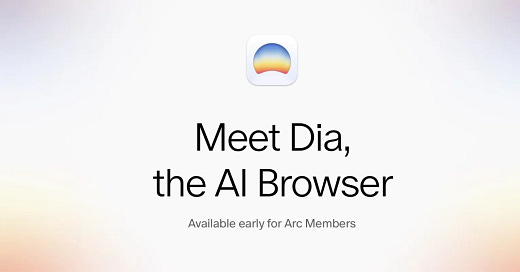So The Browser Company just dropped this thing called Dia—basically an AI-powered browser that lets you chat with your tabs. You ask it a question, and it rifles through everything you've got open to find what you need. But it's more than that—it's also taking notes on every website you visit, building up this personalized context that goes way beyond just your current tabs. Pretty slick, right?
But here's the thing that's been bugging me: what happens when we don't need tabs anymore at all?
Look, I get what they're going for. Dia isn't just slapping AI onto Chrome and calling it a day. They actually thought about how people work and built something that makes sense. But I can't shake the feeling that they're solving yesterday's problem.
Remember when we used to "surf" the web? Like, actually surf—clicking around, following random links, ending up three hours deep in Wikipedia reading about Michael Jordan early retirement conspiracy theories? That was the whole point. The journey was half the fun.
I realized this shift last week when I needed to book a flight to LA. My first instinct wasn't to open Kayak and start comparing airlines, times, and prices across multiple tabs. It was to ask ChatGPT for the best options, then book directly from whatever it recommended. No browsing, no comparison shopping, no decision fatigue. Just: "Find me a good flight to LAX next Friday." Done.
When's the last time you happily juggled ten browser tabs? These days, if I have a question, I want an answer, and I want it now. No detours, no rabbit holes, just give me what I need so I can get on with my life.
The thing is, our habits stayed the same for years. Then suddenly—boom—they all changed at once.
That's what makes Dia so fascinating.
They went back to the drawing board and reimagined what a browser could be. But even that might be missing the point, because most of us aren't really browsing anymore.
Think about it: when you need to research something, do you open five tabs and compare articles? Or do you just ask ChatGPT or Claude and let them handle it?
Dia feels like the most beautiful version of something we're already walking away from. It's like designing the perfect payphone in 2007.
Here's what's actually happening: the browser is being replaced—quietly and permanently—by the agent. Not Chrome vs. Safari anymore—it's ChatGPT, Claude, Perplexity. You don't type URLs. You don't browse categories. You just describe what you want and let the AI figure it out.
No clicking, no linking, no tab-juggling. Just results.
The whole thing collapses down to: "Hey, find me this" and then it's done.
Forget competing with other browsers—they're up against a completely different way of thinking about the internet. One where "browsing" isn't really a thing people do.
To survive, they'll need to think way beyond navigation. Memory, context, agency, trust—that's the new game.
But here's the billion-dollar question: why would I trust Dia over ChatGPT or Claude?
Actually, I think I know the answer. Dia stays focused on what you're actually working on right now—your tabs, your current project, your actual thinking—instead of trying to answer everything about everything. Plus it's learning from your browsing history in ways that general AI tools simply can't.
But they'll need to make that crystal clear, because most people won't immediately get why browsing context matters more than just asking ChatGPT.
And that's the real problem: by the time people understand what makes Dia special, will anyone still care about browsers at all?
Browsers will be like plumbing by 2027—invisible infrastructure that just works in the background. The rest of us will just ask our AI and move on.
Let's be honest: you probably didn't even open a browser tab to read this. You found it in your feed, or your email, or maybe your AI just summarized it for you.
The question isn't whether Dia will succeed. It's whether any of us will even remember what "browsing" used to feel like.





I don't see websites disappearing. I still think people want to shake the hand of the people they want to get to know, and a website is a digital handshake. It's a gut check, a place to see if the vibe is what you need it to be to take the next step.
AI as a gate to every other piece of any information makes a lot of sense to me.
All this chatter doesn't bother with simple reality – today's web has monetization, incentive models, reasons to publish, to create your place, content, and voice.
Chats use everything from old web with its tools, reasons to create content, and haven't created anything for the imaginable only-chat future you described. No new monetization model, no new motivation, only parasiting on old content, which continues to be created with old tools.